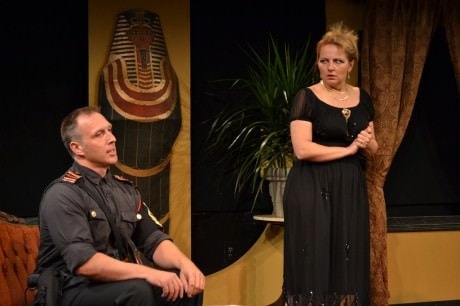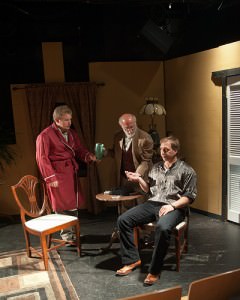When I first heard that Ambassador Theater was mounting Egyptian plays my mind immediately began swimming with imagery: the stereotypical pyramids, but also palms, gold, perfume, mud-brick, mummification, and the hard-beating sun. Egypt is a place and a culture which I have only ever read about – never visited or studied in depth – and that got me terribly excited. What would a play about or set in Egypt be like? What time period were the one-acts from? How much of what I already knew would I find in the text, in the story, in the characters?
Other than a passing familiarity with Egypt’s ancient and classical history, I was ignorant. I had vague notions of several wars between Israel and Egypt (not to mention the rest of the Arab world), and that the conflict was cooled, but not resolved, by a peace treaty.

This look back into my previous understanding of Egypt has revealed to me a host of prejudices I didn’t realize I had. I thought (still think?) that Egypt is a great mystery, that its culture and its heritage since antiquity have been held hostage by religiosity and superstition. Come to find out through the process of working on these two plays, that understanding was simplistic, and failed to tell the whole story.
The most relevant swath of history to Alfred Farag as a playwright was much more recent: 1917 onwards – from the time of the Balfour Declaration to the present. At the Treaty of Versailles, European powers, led by Britain and France sliced up the Middle East without much respect to ethnicity or religious homogeneity. In some cases (think: Kurds) international borders were drawn specifically to divide and suppress certain groups.
The strongmen-led, divided Middle East of 1919-WW2 had a profound impact on one of Farag’s political heroes: Gamal Abdel Nasser. Once in power (~1952 until his death in 1967), Nasser presided over a socializing of Egypt: with a march toward a more egalitarian distribution of wealth, a reliance on Arab nationalism as a political force, the refocus of Islam into the religious (and not necessarily political) sphere, and an anti-colonial hostility toward the West.

The 1960s were Farag’s most prolific period of writing, when his plays were consistently produced. Beyond his own success, Farag considered the decade a ‘golden era’ of theater. He and his contemporaries actively resisted the idea that Arab writers were incapable of producing ‘proper’ theater, like Western Tragedy. Together, they sought to define a new, quintessential Arab national drama; they expanded folk tales, experimented with form and style, and produced plays in large annual festivals. Theater’s variety and scope tanked with Nasser’s death, and the end of the 60s.
The Visitor (1971) and The Peephole (1977) came later, from a period of great disappointment and ennui. With both plays, Farag tried to correct society’s faults, rather than lift it to greater heights. Materialism and the middle class’s willful blindness to social problems became his focus.
So far the process has been illuminating, frustrating, and rewarding. Getting into the mindset of each character, finding their motivations, priorities, hang-ups, and points of pride is a high-energy task – each and every rehearsal.
As with the whole cast and crew, I am very excited that our opening night is coming up soon. Get ready for a suspenseful, challenging, and confusing evening of theater; come be an accomplice!
Trespassing plays through November 3, 2012 at Ambassador Theater at Mead Theatre Lab’s Flashpoint – 916 G Street NW, in Washington, DC. For tickets, purchase them online.






The article is interesting,informative and I hope Amdassador theater taking “risk’ to produce this play will have a great sucsses!